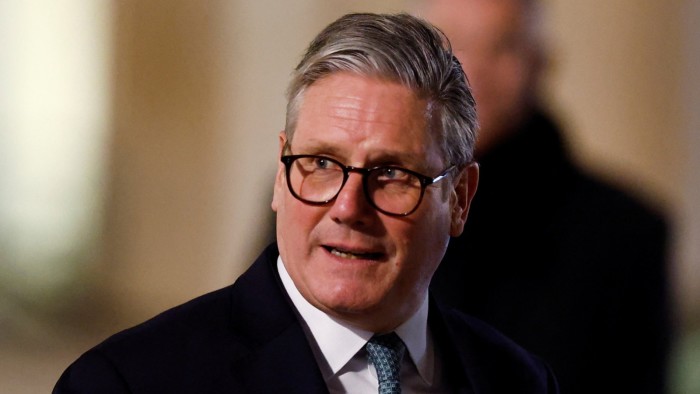Unlock the White House Watch newsletter for free
Your guide to what the 2024 US election means for Washington and the world
Sir Keir Starmer has said Volodymyr Zelenskyy is a “democratically elected leader” and that it is “perfectly reasonable” to suspend elections during wartime, after Donald Trump called the Ukrainian president a “dictator”.
The UK Prime Minister spoke with the Ukrainian president on Wednesday after the US President unleashed a broadside against Zelenskyy on his Truth Social platform, accusing him of being an autocrat who “refuses to have elections”.
Stressing the need for “everyone to work together”, Starmer threw his backing behind Zelenskyy’s decision to suspend elections in Ukraine while the country is riven by conflict, citing a precedent in the UK during the second world war, according to Downing Street.
The UK prime minister reiterated his “support for the US-led efforts to get a lasting peace in Ukraine that deterred Russia from any future aggression”, a Downing Street spokesperson added.
Trump’s comments sparked censure from German Chancellor Olaf Scholz, who said it was “simply wrong and dangerous to deny President Zelenskyy his democratic legitimacy”.
The Ukrainian leader had earlier accused Trump of living in a “disinformation space” after the US president suggested that Kyiv was responsible for triggering war with Russia.
UK defence secretary John Healey was forthright in rebutting the claim, telling reporters during a visit to Norway: “Three years ago, one country illegally invaded another, and since then, the Ukrainians have been fighting for their freedom . . . and they still are.”
Healey also urged against “jeopardising the peace by forgetting about the war”, after the US and Russia kicked off talks about ending the Ukraine conflict in Saudi Arabia on Tuesday.
Starmer’s intervention raises the risk of souring relations with Trump before the UK prime minister travels to the White House next week for talks with the US president.
British ministers privately admit Starmer has been keen to avoid antagonising Trump as he seeks to become a “bridge” between the US and Europe. Starmer also wants to try and persuade Trump not to impose tariffs on British exports to the US.
“On issues like tariffs, why would you rock the boat now?” asked one UK minister. “The prime minister’s going to be meeting Trump next week so they can discuss it face to face.”
Starmer has proposed a summit with European leaders after he returns from Washington to discuss next steps on Ukraine’s future, but he has been under growing political pressure in Britain to publicly criticise Trump.
Liberal Democrat leader Sir Ed Davey, who has carved out a niche for his party in lambasting Trump at a time when other British politicians are trying to curry favour, urged Starmer to take a more robust line.
“When the prime minister visits the White House next week, he must challenge Trump on his Ukraine lies in the strongest possible terms,” Davey said.
He added: “It’s incredibly alarming to see the supposed leader of the free world parroting Putin’s propaganda.”
While Starmer said on Monday he was “ready and willing” to put UK troops in Ukraine to help guarantee its security as part of a peace deal, western officials suggested on Wednesday that offers of British air support might be more likely than the deployment of soldiers on the ground.
The officials sketched out the idea of a force of fewer than 30,000 European-led troops that could help protect nuclear sites, ports and cities in Ukraine, rather than patrolling any frozen front line with Russia.
Trump’s salvo against Zelenskyy also put Conservative leader Kemi Badenoch at odds with the US president, after she sought to draw favourable parallels between her party and his Maga movement on Monday.
“President Zelenskyy is not a dictator,” she said on X on Wednesday. “He is the democratically elected leader of Ukraine who bravely stood up to Putin’s illegal invasion.”
Stressing that under her leadership the Tories would always “stand with” Kyiv, she said Trump was “right that Europe needs to pull its weight”.
Read the full article here




